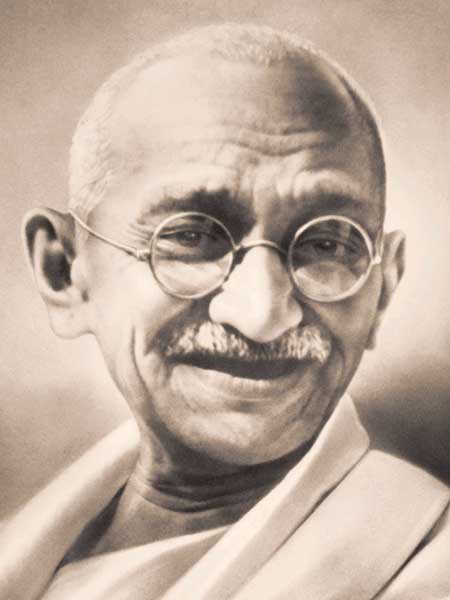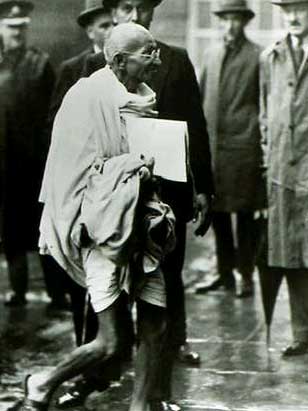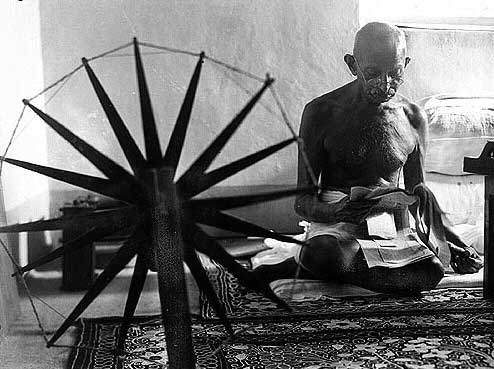GANDHI

Next to consecrated waters of Jumma, near New Delhi, almost one million people were waiting under the sun, while the coffin arrives to the cremation field. White overlooked because the clothes of the people who were there. In Rajghat, a few hundred meters from the river, has been built a pyre made of stones and bricks. There were piled up large sticks with incense. On top of the pyre was Mahatma Gandhi body, with the head to north. In that position Buda had ended his life.
His third son, Ramdas, set fire on the pyre. Women moaned and men cried. So then the place got peaceful and quite while Gandhi was reduced to ashes.
A day before, May 30-1948, a young man had killed Mahatma K. Gandhi, India leader.
When he dead, Gandhi was as he had been always: a simple citizen, without wealth, properties, degrees or official charges. But, every single President, and religion leader from each country gave respect to that brunette thin man who was sixty-eight years old and only wore robe.
“Gandhi made humility and true were more powerful than empires” said Arthur H. Vandenberg, US Senator.
Men and women knew, or felt, that, when Gandhi fell because three bullets from a murderer, the mankind conscience had stayed with out speaker. No one after him that has confronted to his opponent using honesty, goodness, humility and no violence, have gotten so much victories. His life is an unusual success history, gotten by unusual ways.
Mohandas Karamchand Gandhi, (1869-1948).
When he dead, Gandhi was as he had been always: a simple citizen, without wealth, properties, degrees or official charges. But, every single President, and religion leader from each country gave respect to that brunette thin man who was sixty-eight years old and only wore robe.
“Gandhi made humility and true were more powerful than empires” said Arthur H. Vandenberg, US Senator.
Men and women knew, or felt, that, when Gandhi fell because three bullets from a murderer, the mankind conscience had stayed with out speaker. No one after him that has confronted to his opponent using honesty, goodness, humility and no violence, have gotten so much victories. His life is an unusual success history, gotten by unusual ways.
Mohandas Karamchand Gandhi, (1869-1948).

Gandhi was born in Porbandar on October 2, 1869, and was educated in law at University College, London. In 1891, Gandhi returned to India and attempted to establish a law practice in Bombay (now Mumbai), with little success. Two years later an Indian firm with interests in South Africa retained him as legal adviser in its office in Durban. Arriving in Durban, Gandhi found himself treated as a member of an inferior race. He was appalled at the widespread denial of civil liberties and political rights to Indian immigrants to South Africa. He threw himself into the struggle for elementary rights for Indians.
Gandhi remained in South Africa for 20 years, suffering imprisonment many times. In 1896, after being attacked and beaten by white South Africans, Gandhi began to teach a policy of passive resistance to, and non cooperation with, the South African authorities.
He was inspired for this policy by the Russian writer Leo Tolstoy, whose influence on Gandhi was profound. Gandhi also acknowledged his debt to the teachings of Christ and to the 19th-century American writer Henry David Thoreau, especially to Thoreau's famous essay "Civil Disobedience." Gandhi coined the term Satyagraha ("truth and firmness") considered the terms passive resistance and civil disobedience inadequate for his purposes. During the Boer War, Gandhi commanded a Red Cross unit. After the war he returned to his campaign for Indian rights. In 1910 he founded a cooperative colony for Indians near Johannesburg. In 1914 the government of South Africa made important concessions to Ghandi’s demands, including recognition of Indian marriages and abolition of some taxes for them. When he finish his work in South Africa, he returned to India.
When, in 1919, Parliament passed the Rowlatt Acts, giving the Indian colonial authorities emergency powers to deal with so-called revolutionary activities, Satyagraha spread through India, gaining millions of followers. A demonstration against the Rowlatt Acts resulted in a massacre of Indians at Amritsar by British soldiers; in 1920, when the British government failed to make amends; Gandhi proclaimed an organized campaign of non-cooperation. Gandhi was arrested, but the British were soon forced to release him.
The economic aspects of the movement were significant, for the exploitation of Indian villagers by British industrialists had resulted in extreme poverty in the country and the virtual destruction of Indian home industries.
Gandhi became the international symbol of a free India. He lived a spiritual and ascetic life of prayer, fasting, and meditation. His union with his wife became, as he himself stated, that of brother and sister. Refusing earthly possessions, he wore the loincloth and shawl. He subsisted on vegetables, fruit juices, and goat's milk. Indians revered him as a saint and began to call him Mahatma ( "great soul"), a title reserved for the greatest sages.

In 1930 the Mahatma proclaimed a new campaign of civil disobedience, calling upon the Indian population to refuse to pay taxes, particularly the tax on salt. The campaign was a march to the sea, in which thousands of Indians followed Gandhi from Ahmadâbâd to the Arabian Sea, where they made salt by evaporating sea water. Once more the Indian leader was arrested, but he was released in 1931, halting the campaign after the British made some concessions to his demands.
When World War II broke out, the Congress Party and Gandhi demanded a declaration of war aims and their application to India. As a reaction to the unsatisfactory response from the British, the party decided not to support Britain in the war unless the country was granted complete and immediate independence. The British refused, offering compromises that were rejected. When Japan entered the war, Gandhi still refused to agree to Indian participation. He was interned in 1942 but was released two years later because of failing health. By 1944 the Indian struggle for independence was in its final stages, the British government having agreed to independence on condition that the two contending nationalist groups, the Muslim League and the Congress Party, should resolve their differences. Gandhi stood steadfastly against the partition of India but ultimately had to agree, in the hope that internal peace would be achieved after the Muslim demand for separation had been satisfied. India and Pakistan became separate states when the British granted India its independence in 1947. During the riots that followed the partition of India, Gandhi pleaded with Hindus and Muslims to live together peacefully.
On January 13, 1948, he undertook another successful fast in New Delhi to bring about peace. But on January 30, 12 days after the termination of that fast, as he was on his way to his evening prayer meeting, he was assassinated by Nathuram Godse, a Hindu fanatic.
When World War II broke out, the Congress Party and Gandhi demanded a declaration of war aims and their application to India. As a reaction to the unsatisfactory response from the British, the party decided not to support Britain in the war unless the country was granted complete and immediate independence. The British refused, offering compromises that were rejected. When Japan entered the war, Gandhi still refused to agree to Indian participation. He was interned in 1942 but was released two years later because of failing health. By 1944 the Indian struggle for independence was in its final stages, the British government having agreed to independence on condition that the two contending nationalist groups, the Muslim League and the Congress Party, should resolve their differences. Gandhi stood steadfastly against the partition of India but ultimately had to agree, in the hope that internal peace would be achieved after the Muslim demand for separation had been satisfied. India and Pakistan became separate states when the British granted India its independence in 1947. During the riots that followed the partition of India, Gandhi pleaded with Hindus and Muslims to live together peacefully.
On January 13, 1948, he undertook another successful fast in New Delhi to bring about peace. But on January 30, 12 days after the termination of that fast, as he was on his way to his evening prayer meeting, he was assassinated by Nathuram Godse, a Hindu fanatic.
1 comment:
I think that Ghandi was a great spiritual leader mainly and for that reason the whole people that admired him the it continued and in certain cases until they ended up idolizing it, I admire him a lot for its great heart and because I consider that a great person that looked for to help who hended, He was solidarity with the noble causes.
Post a Comment